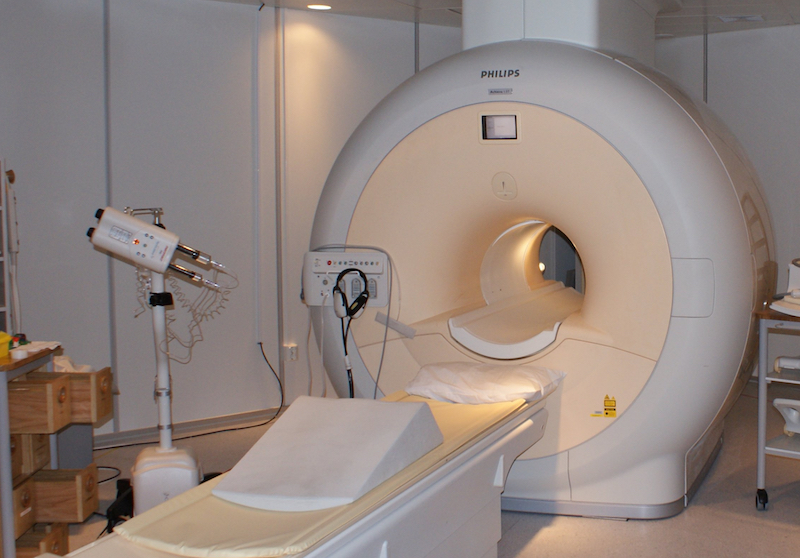
MRI machine // Photo: Wikimedia
Op-ed: Personal health information must be protected
The following is an op-ed written by Andrea Rounce and Karine Levasseur, associate professors in the department of political studies. It originally appeared in the Winnipeg Free Press on April 20, 2017.
Manitobans have long been concerned about who gets preferential access to health services. The recent auditor general report on access to MRI services raises important questions about who gets their MRI first, while offering reasons why preferential treatment might exist — and might even be warranted.
While it is the auditor general’s job to examine activities funded by the government of Manitoba, it is also clear it is the AG’s job to protect confidential information gathered during their investigations. The Winnipeg Free Press article about the confidential version of this report (which wasn’t publicly available, but was leaked to the Free Press) included names of prominent public figures who may have “jumped the queue” to access MRI diagnostics. While the auditor general’s report states many of these people may not have known they were potentially receiving preferential treatment, several of these public figures — former politicians, senior public servants and health region executives — responded to media requests by providing further information about their health conditions and the treatment that necessitated the scan.
We don’t know who leaked the confidential report to the Free Press. It is possible the person who provided it believes Manitobans deserve to know more about the alleged wrongdoings addressed in the public version of the report. If that person works for government, “whistleblowing” legislation and processes are in place to report an issue such as this to government without disclosing sensitive health information, and while protecting the person “blowing the whistle.” But if the person providing the confidential report to the Free Press did not go through the proper channels, this is a leak and they will not be protected from the consequences of their actions. While we don’t know how this may have been managed inside government, we know Manitoba and other provinces commit to protecting citizens’ personal and private health information. In cases where such information is disclosed and publicized, Manitoba’s ombudsman has the responsibility to investigate, determining who was responsible for the breach of confidentiality, what the impact might be and how to prevent such a breach from happening again.
Manitobans — especially those named in the confidential report — must expect the ombudsman to investigate and explain what happened and who should be held responsible. While some may say public figures should not have responded to media questions, they may have felt pressured to provide more information that the public ultimately does not have the right to know. Their reputations may have been put at risk, and the public’s trust in the auditor general’s office, and the Manitoba government overall, may also have been damaged. The minister of health has said he will apologize to those named in the confidential report for the breach of their privacy, and investigations have been launched by the auditor general, ombudsman, WRHA and the department of health into how this breach occurred.
This case highlights the tension that exists between whistleblowing and the protection of private health information. On the one hand, whistleblowing is done in the interest of accountability and transparency. On the other hand, protecting personal health information is also done to protect the public interest, and in fact, Manitoba has enacted legislation in the form of the Personal Health Information Act. So, which one wins? Who decides what the public should know? These questions are not easy, but we argue that protecting personal health information must reign supreme in this case. After all, the leaked report and subsequent Free Press article could have easily made the point about preferential influence without revealing people’s names. We all have the responsibility to protect citizens’ personal and private health information. As Manitobans, we should expect nothing less.







It is true, the Free Press should not have leaked names of persons who had preferential treatment or jumped the queue. The point is that the WRHA and some of its executives are abusing the system and have lied so may times that little they say can be believed. When horrific care happens they are the first to say it was good care, simply because they don’t care. They come first and something should be done about this horrible bureaucracy. Name should not have been published but I am happy that the public knows about the elitist mentality at the WRHA. Now watch the spin.